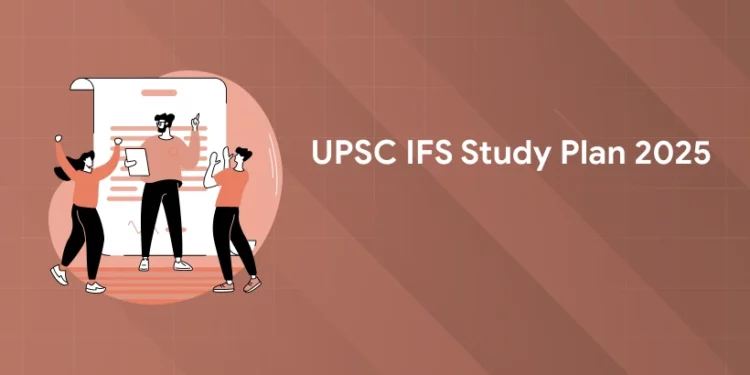Table of Contents
A perfect plan and its execution will surely help aspirants to crack any of the competitive examinations. While considering the Union Public Service Commission exams, the toughest competitive exam towards the privileged positions in the Indian Administrative Services, planned preparations are very much important. The huge syllabus to be covered and the practice with descriptive writing and the personality test, really need an investment of time and effort. So, here in this article let us go through a UPSC IFS Study Plan 2025.
The UPSC Indian Forest Service examination dates have been announced for both the prelims and mains examination. The preliminary exam date for the Indian Forest Service is out soon. IFS, will be It is high time to start the revisions, for the candidates who have applied for the examination and for those who are aspiring for the IFS 2025, can know about the preparation tips and plans.
Follow Entri for all updates UPSC Civil Services, and IFS Examination 2025
UPSC IFS Study Plan
Study plans made for the initial preparations for understanding basics, then the focused preparations for the improvement of areas that you are weak, and lastly the revision plans have to be done considering your study skills. The candidates should know their understandings of exams and topics, their ability to grasp and reproduce the learned facts for the mock tests and exam. Once made, the UPSC IFS study plans are not be changed or skipped. Follow them with seriousness to permitted six attempts at the examination.
As the UPSC IFS Prelims Exam Date is near, let us check a smart revision study plan. This is a generalized study plan, and candidates can add or remove the topics. The current affairs topics of 2024, and 2025 have to be revised.
| UPSC IFS Day-wise plan | Revision Topics |
| Day 1 | Paper I Mock Test and Mock Test Analysis, Current Affairs update, newspaper reading |
| Day 2 | Current Affairs update, newspaper reading, History topics |
| Day 3 | Paper-II Mock Test and Mock Test Analysis, Current Affairs update, newspaper reading |
| Day 4 | Current Affairs update, newspaper reading, Polity topics |
| Day 5 | Current Affairs update, newspaper reading, Reasoning Ability |
| Day 6 | Paper I Mock Test and Mock Test Analysis, Mathematics |
| Day 7 | Current Affairs update, newspaper reading, Comprehension |
| Day 8 | Current Affairs update, newspaper reading, Science topics |
| Day 9 | Paper-II Mock Test and Mock Test Analysis, Current affairs and newspaper reading |
| Day 10 | Mains Topics – Descriptive Writing, Current Affairs update, newspaper reading |
| Day 11 | Mock Test of Mains, Current Affairs update, newspaper reading |
| Day 12 | Optional Subject preparation and Current Affairs update, newspaper reading |
| Day 13 | |
| Day 14 | |
| Day 15 | |
| Day 16 | Current Affairs update, newspaper reading, static GK |
| Day 17 | Paper I Mock Test and Mock Test Analysis, Current Affairs update, newspaper reading |
| Day 18 | Current Affairs update, newspaper reading, Economics |
| Day 19 | Current Affairs update, newspaper reading, subject-wise mocks |
| Day 20 | Current Affairs update, newspaper reading, Environmental Ecology |
| Day 21 | Current Affairs update, newspaper reading, Paper I Mock Test and Mock Test Analysis |
| Day 22 | Current Affairs update, newspaper reading, General revision |
| Day 23 | Current Affairs update, newspaper reading, General revision |
| Day 24 | Current Affairs update, newspaper reading, General revision |
| Day 25 | Current Affairs update, newspaper reading, Paper II Mock Test and Mock Test Analysis |
| Day 26 | Current Affairs update, newspaper reading, General revision |
| Day 27 | Current Affairs update, newspaper reading, General revision |
| Day 28 | Current Affairs update, newspaper reading, Paper I Mock Test and Mock Test Analysis |
| Day 29 | Static GK and Current Affairs, newspaper reading, General revision |
| Day 30 | Current Affairs update, newspaper reading, Paper II Mock Test and Mock Test Analysis |
| Day 31 | Current Affairs update, newspaper reading |
Focus Points while making UPSC IFS Study Plan
1: Which one of the following is not a Harappan site?
A better understanding of Plan of Examination
The Indian Forest Service competitive examination comprises two successive stages, that is,
- Civil Services (Preliminary) Examination (Objective Type) – screening and selection of candidates for the Indian Forest Service (Main) Examination.
- Indian Forest Service (Main) Examination (Written and Interview) – To fill the vacancies notified in the notification
UPSC IFS Examination Pattern
- The IFS preliminary examination consists of two papers of Objective type (multiple choice questions) and carries a maximum of 400 marks.
- The UPSC IFS prelims examination serves as a screening test only and the examination comprises of two compulsory Papers of 200 marks each.
- Question papers will be of the objective type (multiple choice questions) and will be set both in Hindi and English.
- The General Studies Paper-II of the Civil Services (Preliminary) Examination will be a qualifying paper with minimum qualifying marks fixed at 33%.
The Main Examination consists of a written examination and an interview test. The mains written examination consists of 6 papers of conventional essay type, while the interview will carry 300 marks (with no minimum qualifying marks). The question papers must be answered in English and the question papers will be set in English only. And, the marks thus obtained by the candidates in the Main Examination (written part and interview) will determine the final ranking.
- Paper I—General English – 300 Marks
- Paper-II—General Knowledge – 300 Marks
- Papers III, IV, V, and VI—Any two subjects of the list of the optional subjects. With each subject having two papers of 200 marks for each paper.
- Interview for Personality Test with maximum marks of 300.
UPSC IFS Examination Syllabus
Preliminary Exam Syllabus IFS
| Subject papers | Syllabus | Marks for Papers | Duration |
| Paper I | Current events of national and international importance
History of India and Indian National Movement Indian and World Geography- Physical, Social, Economic Geography of India and the World Indian Polity and Governance- Constitution, Political System, Panchayati Raj, Public Policy, Rights Issues Economic and Social Development- Sustainable Development, Poverty, Inclusion, Demographics, Social Sector Initiatives General issues on Environmental ecology, Bio-diversity, and Climate Change – that do not require subject specialization General Science |
200 marks | 2 hours |
| Paper-II | Comprehension
Interpersonal skills including communication skills Logical reasoning and analytical ability Decision making and problem solving General mental ability Basic numeracy (numbers and their relations, orders of magnitude, etc.) (Class X level), Data interpretation (charts, graphs, tables, data sufficiency, etc. – Class X level) |
200 marks | 2 hours |
UPSC IFS Main Examination Syllabus
The UPSC IFS standard of papers in General English and General Knowledge will be of a Science or Engineering graduate of an Indian University
General Knowledge paper for the IFS mains descriptive written exam includes knowledge of current events e questions on Indian Polity including the political system and the Constitution of India, History of India and Geography
And the total number of questions in the question papers of optional subjects will be eight, of which the candidate should attempt any five questions.
Wise Selection of Optional Papers
List of optional subjects
Agriculture, Agricultural Engineering, Animal Husbandry & Veterinary Science, Botany, Chemistry, Chemical Engineering, Civil Engineering, Forestry, Geology, Mathematics, Mechanical Engineering, Physics, Statistics, Zoology
However, candidates will not be allowed to choose the following combination of subjects
- Agriculture and Agricultural Engineering
- Agriculture and Animal Husbandry & Veterinary Science
- Agriculture and Forestry
- Chemistry and Chemical Engineering
- Mathematics and Statistics
- Of the Engineering subjects like Agricultural Engineering, Chemical Engineering, Civil Engineering and Mechanical Engineering—not more than one subject;
Handwriting for the Descriptive Test
It is important to add writing skill improvement! It is clearly mentioned in the notification that, if a candidate’s handwriting is not easily legible, the deduction will be made on this account from the total marks otherwise accruing to him/her. So, practice writing along with the preparation period.
In-depth Subject Knowledge
The UPSC exams prelims will be more easily cracked compared to the mains. Prelim’s test is the objective and a correct understanding of the facts will enough. But for the mains descriptive test, in depth knowledge is essential. And, it is to be noted that no marks will be allotted for mere superficial knowledge.
Practice Current Affairs and Static GK Mock Tests
Subject Wise Previous Question Papers PDF
You can check out the Union Public Service Commission Indian Forest Service previous year examination papers according to the subjects included in this competitive examination. If you want to download the subject-wise question papers then you can do so by checking out the table given below. We have shared the subject wise previous year examination question papers to help the people prepare for the competitive examination. You can download the subject-wise papers if you want to prepare for the examination separately for each subject.
| Subjects | Papers |
| Agricultural Engineering |
|
| Agriculture |
|
| Animal husbandry and veterinary science |
|
| Botany |
|
| Chemical Engineering |
|
| Chemistry |
|
| Civil Engineering |
|
| Forestry |
|
| General English | |
| General Knowledge | |
| Geology |
|
| Mathematics |
|
| Mechanical Engineering |
|
| Physics |
|
| Statistics |
|
| Zoology |
|
Preparation Tips for UPSC IFS
- Make the aim of clearing the exam. Imagine yourself as an IFS officer. Thus, make it a passion rather than a burden.
- Choose early hours of the day to study. The calm and fresh time will boost your energy.
- Syllabus – as mentioned above, be thorough about the portions and exam patterns. Follow the syllabus, without skipping the topics.
- Study plans – follow the plan made by candidates. Focus on individual strengths and weaknesses according to the topics.
- Optional subject selection is important. So, choose wisely the UPSC IFS optional subject combinations.
- Never stress much. Always keep a plan B, like for UPSC exams, you can give try to State-wise PSCs. Attempting more competitive exams will aid you to increase your self-confidence.
- Try to do exercises and bring up your hobby. Use break time to indulge in the hobbies, to keep away the boredom of study.
- Mental health is equally Important Practice meditation to relax!
- Stay updated with the current affairs of 2024, 2025. And current affairs related to subject topics are also important.
- Read newspapers, especially, The Hindu. Note down points and topics of relevance from the exam point of view.
- Magazines like Kurukshetra, online platforms give point-wise updates and GK mock tests. Attempt these frequently.
- Write notes and also practice essay writing etc. for descriptive papers. Note that handwriting is important for Mains.
- Practicing mock tests online and attempting previous questions papers are must-do things. Practice all available and analyze results, marks. Focus and improve the weaker sections.
- After the mains exam result for UPSC IFS, prepare for the interview. Attend mock interviews and be confident about yourself. Practice regularly asked introduction, then-current topics/ happening in India and International news.
Practice Current Affairs Mock Test for UPSC and Daily Rank Booster Questions
Conclusion Note
To conclude, as an aspirant of the UPSC exam candidates should be aware that there are no shortcuts or even luck factors. Preparation with determination and passion will help you to succeed. The inspiring stories of the successful candidates can boost confidence, but try to make uniqueness in your study plan. Follow the plan which suits you, and brings you to the top list. And, hope the study plan and preparation tips helped you. Have a good and favorable revision time!
Follow Entri for video classes and mock tests on General Papers for CSAT 2025
| UPSC IFS Exam Information Links | |
| UPSC IFS Notification | UPSC IFS Mock Test |
| UPSC IFS Syllabus | UPSC IFS Video Course |
| UPSC IFS Exam Date | UPSC IFS Study Materials |
| UPSC IFS Application Form | UPSC IFS Interview Questions |
| UPSC IFS Vacancy | UPSC IFS Job Profile |
| UPSC IFS Admit Card | UPSC IFS Salary |
| UPSC IFS Previous Question Papers | |
| UPSC IFS Best Books | UPSC IFS Result |
| UPSC IFS Eligibility Criteria | UPSC IFS Cutoff |
| UPSC IFS Selection Process | UPSC IFS Exam Analysis |
| UPSC IFS Answer Key | |











